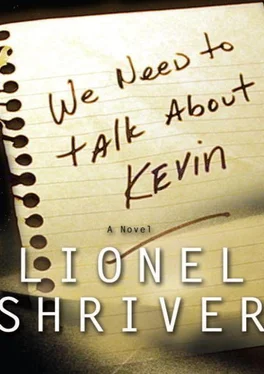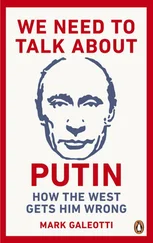Lionel Shriver
WE NEED TO TALK ABOUT KEVIN
For Terri
One worst-case scenario we’ve both escaped.
A child needs your love most when he deserves it least.
—ERMA BOMBECK
Dear Franklin,
I’m unsure why one trifling incident this afternoon has moved me to write to you. But since we’ve been separated, I may most miss coming home to deliver the narrative curiosities of my day, the way a cat might lay mice at your feet: the small, humble offerings that couples proffer after foraging in separate backyards. Were you still installed in my kitchen, slathering crunchy peanut butter on Branola though it was almost time for dinner, I’d no sooner have put down the bags, one leaking a clear viscous drool, than this little story would come tumbling out, even before I chided that we’re having pasta tonight so would you please not eat that whole sandwich.
In the early days, of course, my tales were exotic imports, from Lisbon, from Katmandu. But no one wants to hear stories from abroad, really, and I could detect from your telltale politeness that you privately preferred anecdotal trinkets from closer to home: an eccentric encounter with a toll collector on the George Washington Bridge, say. Marvels from the mundane helped to ratify your view that all my foreign travel was a kind of cheating. My souvenirs—a packet of slightly stale Belgian waffles, the British expression for “piffle” (codswallop!) —were artificially imbued with magic by mere dint of distance. Like those baubles the Japanese exchange—in a box in a bag, in a box in a bag—the sheen on my offerings from far afield was all packaging. What a more considerable achievement, to root around in the untransubstantiated rubbish of plain old New York state and scrounge a moment of piquancy from a trip to the Nyack Grand Union.
Which is just where my story takes place. I seem finally to be learning what you were always trying to teach me, that my own country is as exotic and even as perilous as Algeria. I was in the dairy aisle and didn’t need much; I wouldn’t. I never eat pasta these days, without you to dispatch most of the bowl. I do miss your gusto.
It’s still difficult for me to venture into public. You would think, in a country that so famously has “no sense of history,” as Europeans claim, that I might cash in on America’s famous amnesia. No such luck. No one in this “community” shows any signs of forgetting, after a year and eight months—to the day. So I have to steel myself when provisions run low. Oh, for the clerks at the 7-Eleven on Hopewell Street my novelty has worn off, and I can pick up a quart of milk without glares. But our regular Grand Union remains a gauntlet.
I always feel furtive there. To compensate, I force my back straight, my shoulders square. I see now what they mean by “holding your head high,” and I am sometimes surprised by how much interior transformation a ramrod posture can afford. When I stand physically proud, I feel a small measure less mortified.
Debating medium eggs or large, I glanced toward the yogurts. A few feet away, a fellow shopper’s frazzled black hair went white at the roots for a good inch, while its curl held only at the ends: an old permanent grown out. Her lavender top and matching skirt may have once been stylish, but now the blouse bound under the arms and the peplum served to emphasize heavy hips. The outfit needed pressing, and the padded shoulders bore the faint stripe of fading from a wire hanger. Something from the nether regions of the closet, I concluded, what you reach for when everything else is filthy or on the floor. As the woman’s head tilted toward the processed cheese, I caught the crease of a double chin.
Don’t try to guess; you’d never recognize her from that portrait. She was once so neurotically svelte, sharply cornered, and glossy as if commercially gift wrapped. Though it may be more romantic to picture the bereaved as gaunt, I imagine you can grieve as efficiently with chocolates as with tap water. Besides, there are women who keep themselves sleek and smartly turned out less to please a spouse than to keep up with a daughter, and, thanks to us, she lacks that incentive these days.
It was Mary Woolford. I’m not proud of this, but I couldn’t face her. I reeled. My hands went clammy as I fumbled with the carton, checking that the eggs were whole. I rearranged my features into those of a shopper who had just remembered something in the next aisle over and managed to place the eggs on the child-seat without turning. Scuttling off on this pretense of mission, I left the cart behind, because the wheels squeaked. I caught my breath in soup.
I should have been prepared, and often am—girded, guarded, often to no purpose as it turns out. But I can’t clank out the door in full armor to run every silly errand, and besides, how can Mary harm me now? She has tried her damnedest; she’s taken me to court. Still, I could not tame my heartbeat, nor return to dairy right away, even once I realized that I’d left that embroidered bag from Egypt, with my wallet, in the cart.
Which is the only reason I didn’t abandon the Grand Union altogether. I eventually had to skulk back to my bag, and so I meditated on Campbell’s asparagus and cheese, thinking aimlessly how Warhol would be appalled by the redesign.
By the time I crept back the coast was clear, and I swept up my cart, abruptly the busy professional woman who must make quick work of domestic chores. A familiar role, you would think. Yet it’s been so long since I thought of myself that way that I felt sure the folks ahead of me at checkout must have pegged my impatience not as the imperiousness of the secondearner for whom time is money, but as the moist, urgent panic of a fugitive.
When I unloaded my motley groceries, the egg carton felt sticky, which moved the salesclerk to flip it open. Ah. Mary Woolford had spotted me after all.
“All twelve!” the girl exclaimed. “I’ll have them get you another carton.”
I stopped her. “No, no,” I said. “I’m in a hurry. I’ll take them as they are.”
“But they’re totally — ”
“I’ll take them as they are!” There’s no better way to get people to cooperate in this country than by seeming a little unhinged. After dabbing pointedly at the price code with a Kleenex, she scanned the eggs, then wiped her hands on the tissue with a rolled eye.
“Khatchadourian,” the girl pronounced when I handed her my debit card. She spoke loudly, as if to those waiting in line. It was late afternoon, the right shift for an after-school job; plausibly about seventeen, this girl could have been one of Kevin’s classmates. Sure, there are half a dozen high schools in this area, and her family might have just moved here from California. But from the look in her eye I didn’t think so. She fixed me with a hard stare. “That’s an unusual name.”
I’m not sure what got into me, but I’m so tired of this. It’s not that I have no shame. Rather, I’m exhausted with shame, slippery all over with its sticky albumen taint. It is not an emotion that leads anywhere. “I’m the only Khatchadourian in New York state,” I flouted, and snatched my card back. She threw my eggs in a bag, where they drooled a little more.
So now I’m home—what passes for it. Of course you’ve never been here, so allow me to describe it for you.
You’d be taken aback. Not least because I’ve opted to remain in Gladstone, after kicking up such a fuss about moving to the suburbs in the first place. But I felt I should stay within driving distance of Kevin. Besides, much as I crave anonymity, it’s not that I want my neighbors to forget who I am; I want to, and that is not an opportunity any town affords. This is the one place in the world where the ramifications of my life are fully felt, and it’s far less important to me to be liked these days than to be understood.
Читать дальше













